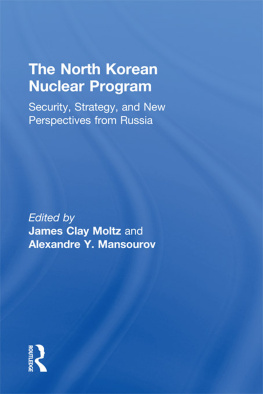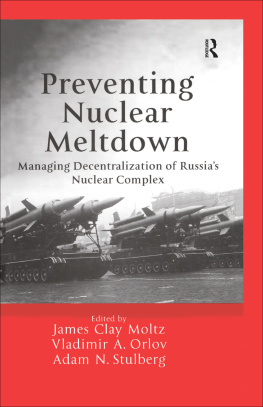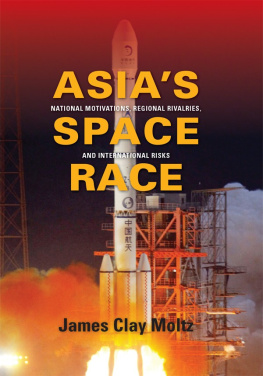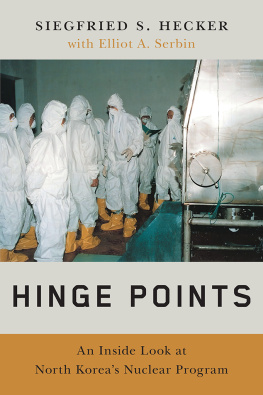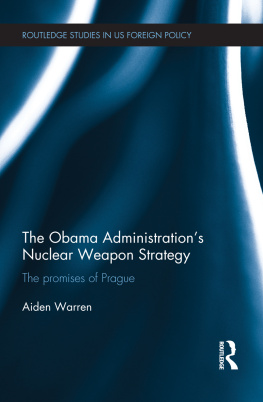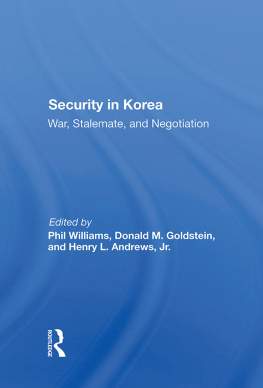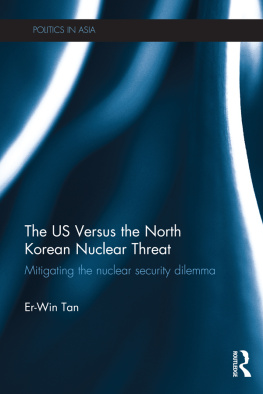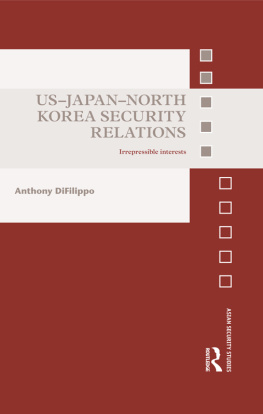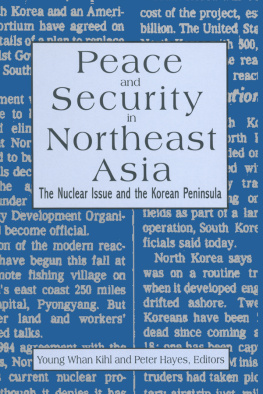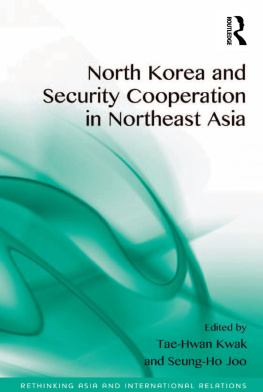The North Korean Nuclear Program
More praise for
The North Korean Nuclear Program
"This is the comprehensive briefing book that American negotiators needed to have prior to tension filled negotiations over the DPRK's threats to withdraw from the NPT in 1993. It provides many of the missing pieces as part of the international effort to interpret the motives, determination, and level of know-how that have driven North Koreas past efforts to acquire nuclear capabilities."
Scott Snyder, Program Officer,
Research and Studies Program,
United States Institute of Peace
"I applaud the editors efforts in putting together such a comprehensive volume. This provides an important piece in ongoing efforts to understand the puzzle of the DPRK nuclear program, and perhaps more importantly, the North Korean regime."
L . Gordon Flake, Executive Director,
The Mansfield Center for Pacific Affairs
"This book offers many new insights into the opaque North Korean decision-making process and casts light on why North Korea may be seeking nuclear weapons. American policy makers who fail to learn from the lessons gained by reading The North Korean Nuclear Program put both the United States and the East Asian region at risk."
Peter Hayes, Co-Director,
Nautilus Institute for Security and
Sustainable Development
First Published in 2000 by
Routledge
29 West 35th Street
New York, NY 10001
Published in Great Britain by
Routledge
11 New Fetter Lane
London EC4P 4E E
This edition published 2011 by Routledge:
Routledge
Taylor & Francis Group
711 Third Avenue
New York, N Y 10017 | Routledge
Taylor & Francis Group
2 Park Square, Milton Park
Abingdon, Oxon OX14 4RN |
Copyright 2000 by Routledge
All rights reserved. No part of this book may be reprinted or reproduced or utilized in any form or by any electronic, mechanical or other means, now known or hereafter invented, including photocopying and recording or in any information storage or retrieval system, without permission in writing from the publishers.
Library of Congress Cataloging-in-Publication Data
The North Korean nuclear program: security, strategy, and new perspectives from Russia / edited by James Clay Moltz and Alexandre Y. Mansourov.
p. cm.
ISBN 0-415-92369-7 (H: alk. paper). ISBN 0-415-92370-0 (P: alk. paper)
1. Nuclear weaponsKorea (North) 2. Nuclear industryKorea (North) 3. Korea (North)Military relationsRussia (Federation) 4. Korea (North) Foreign relationsKorea (North) 5. Russia (Federation)Foreign relationsKorea (North) 6. Russia (Federation)Foreign relationsKorea (North) I. Moltz, James Clay. II. Mansourov, Alexandre Y.
U264.5.K7N67 2000
| 355.02'7'95193dc21 | 99-20510
CIP |
Acknowledgments
The editors would like to express their gratitude to Dr. Evgeniy Bazhanov of the Russian Diplomatic Academy and the Institute for Contemporary International Studies (ICIS) in Moscow for his considerable assistance in various stages of this book's development. Dr. Pyotr Razvin of the ICIS also provided valuable advice as well as considerable technical assistance in transferring the initial draft chapters from Moscow to Monterey. Other experts who helped in particular aspects of the book's final preparation include Dr. Vladimir Li (Diplomatic Academy) and Dr. Mitchell Reiss (KEDO). In addition, a number of individuals from the Center for Nonproliferation Studies at the Monterey Institute of International Studies deserve thanks for their help at various stages in the preparation of the manuscript: Stanley Shepard, Pat Levac, Filip Stabrowski, Kevin Orfall, Sarah Diehl, and Russell Willeford. The editors also are grateful to Routledge Press and, in particular, to associate politics editor Amy Shipper for her enthusiasm and their professionalism in handling the manuscript. Finally, the editors express their special thanks to Dr. Thomas Graham and the Rockefeller Foundation for their support of three workshops in Moscow organized by the CNS and ICIS that originally brought together the Russian authors featured here.
Foreword
Mitchell B. Reiss
Few countries have posed more vexing problems for the international community in recent years than the Democratic People's Republic of Korea (DPRK). Whether projecting strength with its ongoing nuclear weapons program, ballistic missile tests, and provocative military actions toward the Republic of Korea (ROK), or signaling weakness by appealing for humanitarian assistance to save its own starving population, the DPRK has presented a picture of a regime at once proud and insecure, defiant and vulnerable. Above all, it has eluded easy definition, manipulating uncertainty over its intentions, motives, and decision making to try to win tactical and strategic advantage. Indeed, the puzzling nature of the regime recalls Winston Churchill's famous 1939 description of Stalinist Russia: "I cannot forecast to you the action of Russia. It is a riddle wrapped in a mystery inside an enigma." More recently, former U.S. Ambassador to the ROK Donald P. Gregg has called the DPRK " the longest-running intelligence failure in U.S. history."
We are especially fortunate, then, that James Clay Moltz and Alexandre Y. Mansourov have labored long and hard to assemble this volume by Russian diplomats and scholars on North Korea and its nuclear program. It is a tonic to the paucity of hard facts surrounding the secretive North Korean regime. Moscow can offer firsthand experience in dealing with Pyongyang since the end of the Second World War. Soviet officials, diplomats, and scholars can provide both con-text and insight into the DPRK nuclear weapons program, correctly viewing it as a product of the country's history, ideology, politics, and security environment. They offer a perspective not often heard (and perhaps not even considered) among American policy officials and academics when considering Northeast Asian security issues. At a time when the United States and its allies are spending of millions of dollars trying to divine the internal workings of the Pyongyang regime, here is a book written by those who have actually lived, studied, worked, argued, and negotiated with North Koreans, in some cases over many years.
Not surprisingly, then, this volume contains some valuable assessments and sound judgments. Particularly noteworthy are two chapters by Natalya Bazhanova, a member of the Russian Academy of Sciences: one on the DPRK's decision to build the bomb and the other on the likelihood of economic reform taking root. On economic reform, she argues that " reforms are likely to create inflation, unemployment, and social instability ... one can expect the Pyongyang-style economic adjustment policy to continue to be characterized by internal contradictions that only make sense within Pyongyang's stilted worldview: efforts to attract foreign capital while strengthening political and ideological control over the population."
In another chapter, Evgeniy Bazhanov, a veteran Soviet diplomat, confirms the suspicions of many by informing us that the DPRK " has made serious efforts to create a missile force and to equip it with nuclear warheads." And in the most thought-provoking contribution to this volume, General Alexander Zarubin, a staff member of the Russian Security Council, charts a course for direct militaryto-military contacts between the DPRK and ROK commands as " the way out of the current impasse" on the Korean Peninsula.

